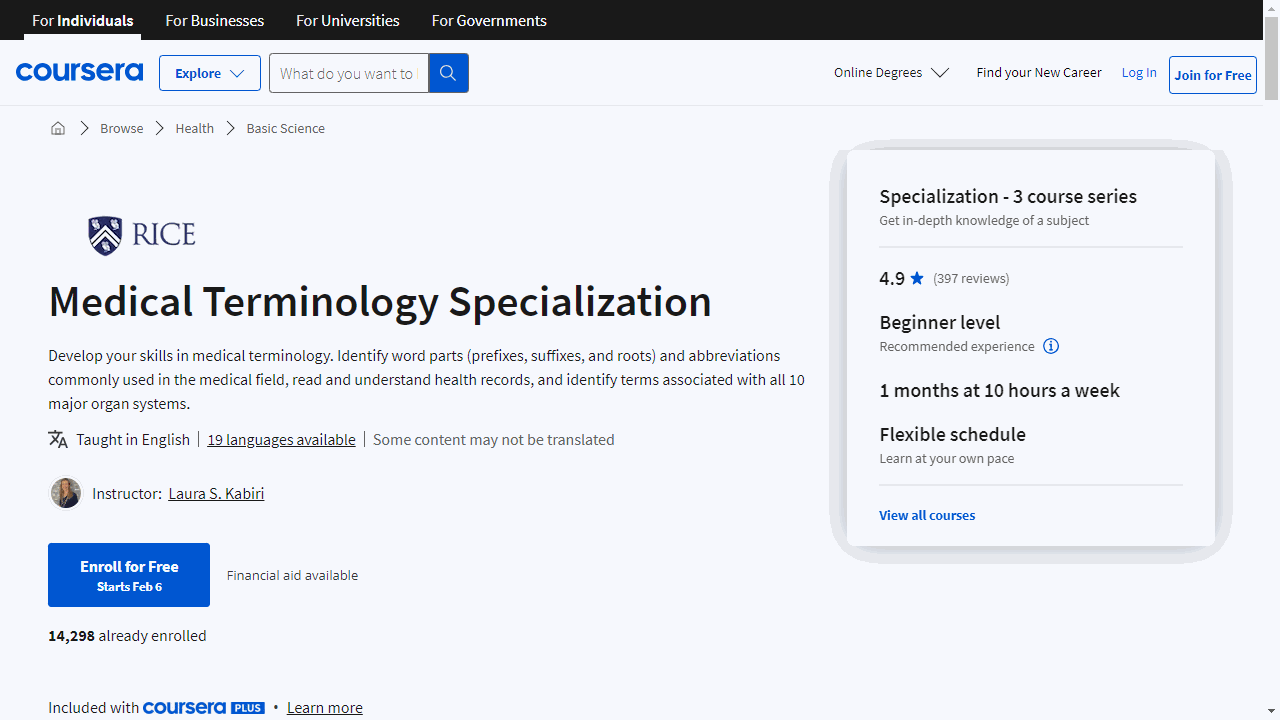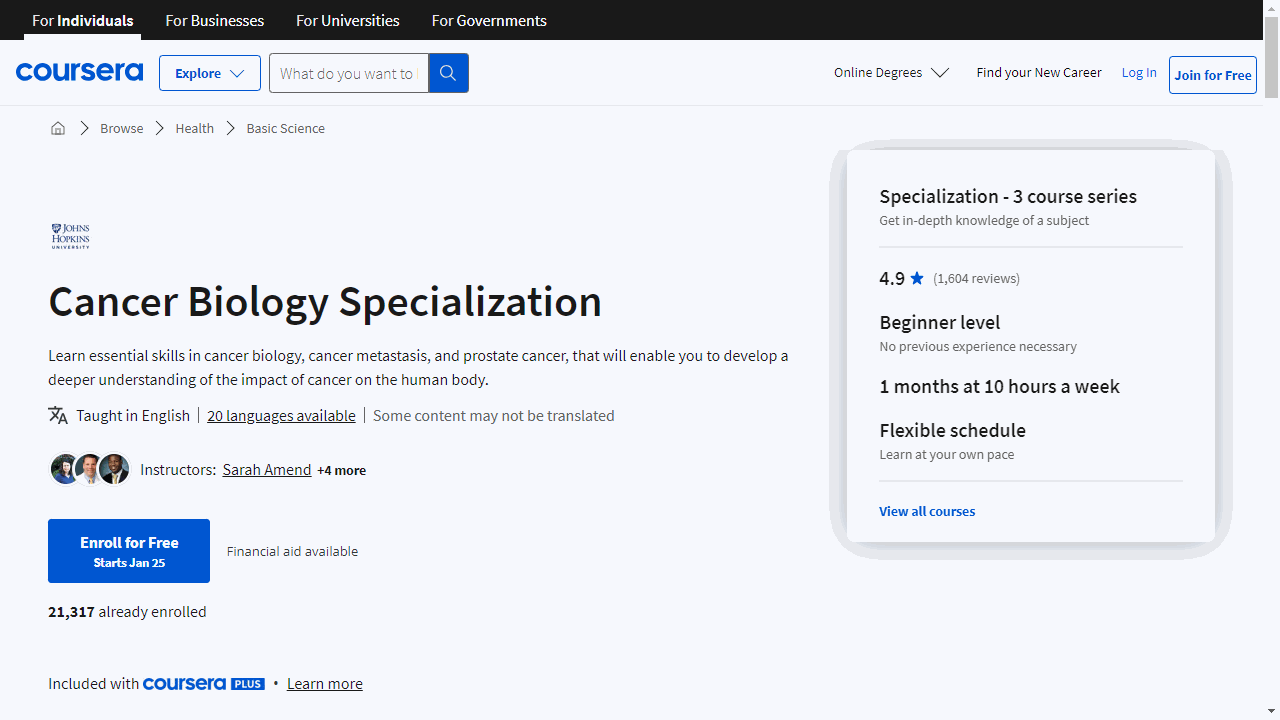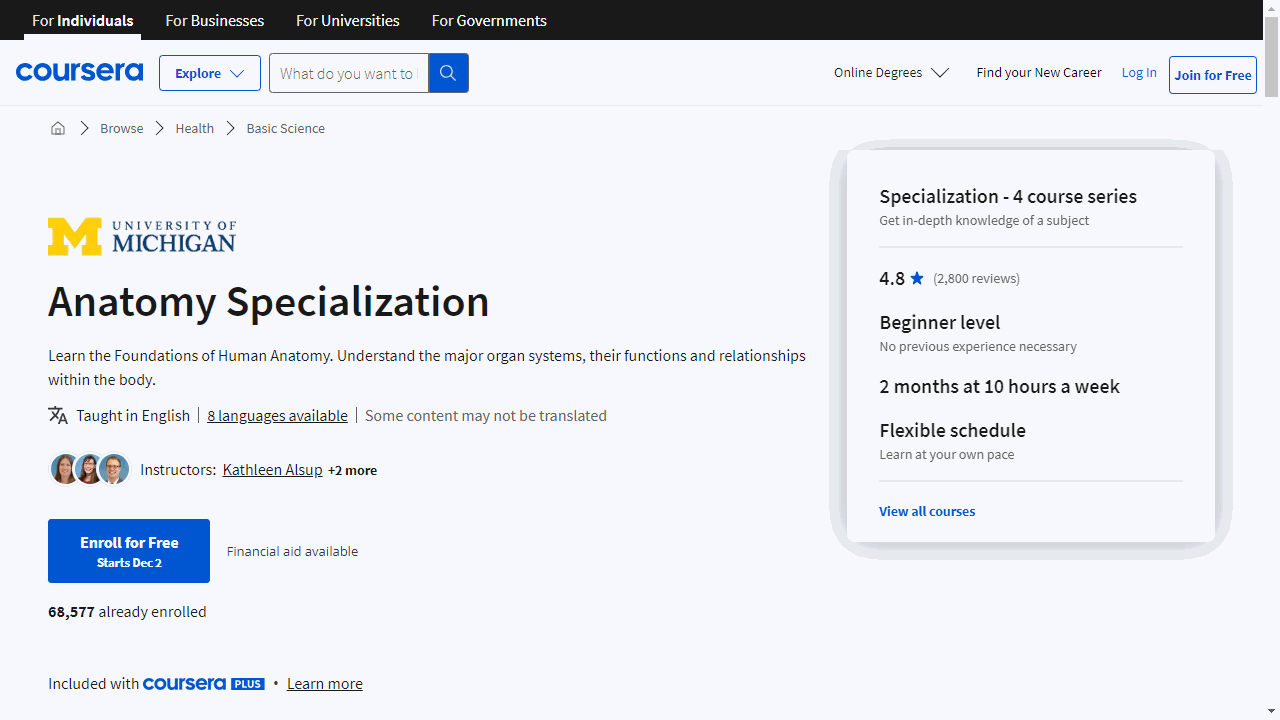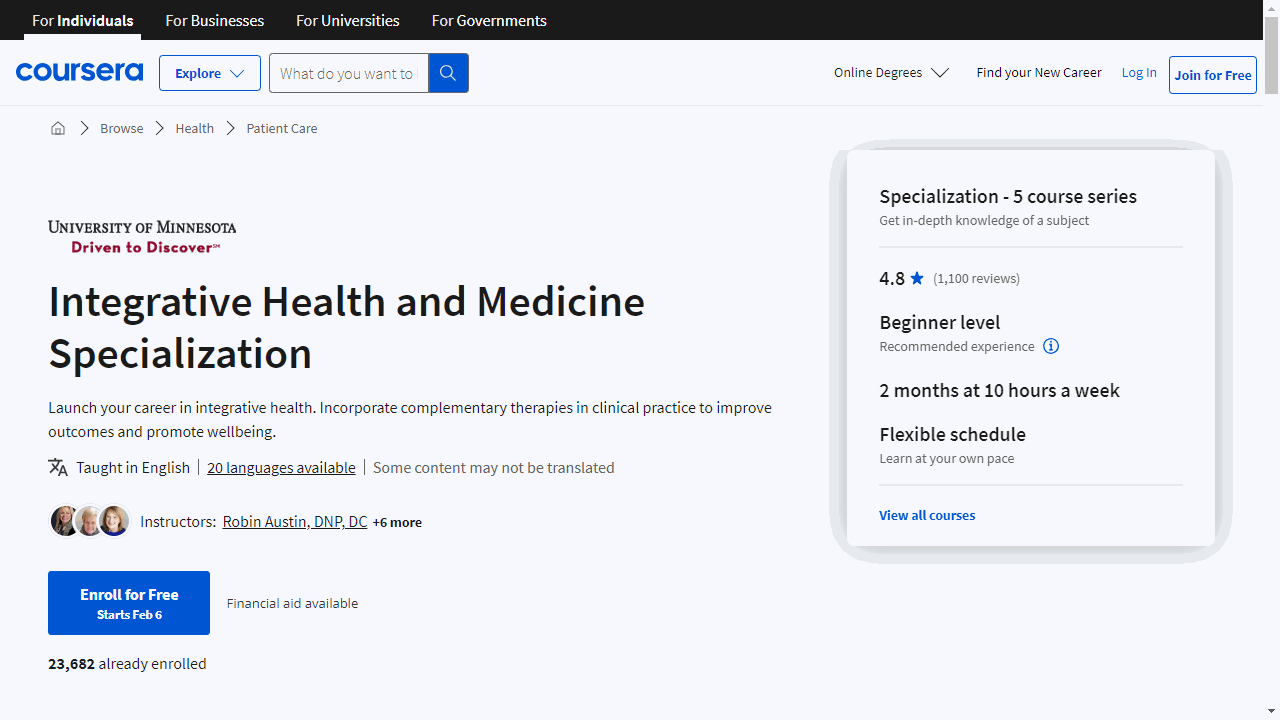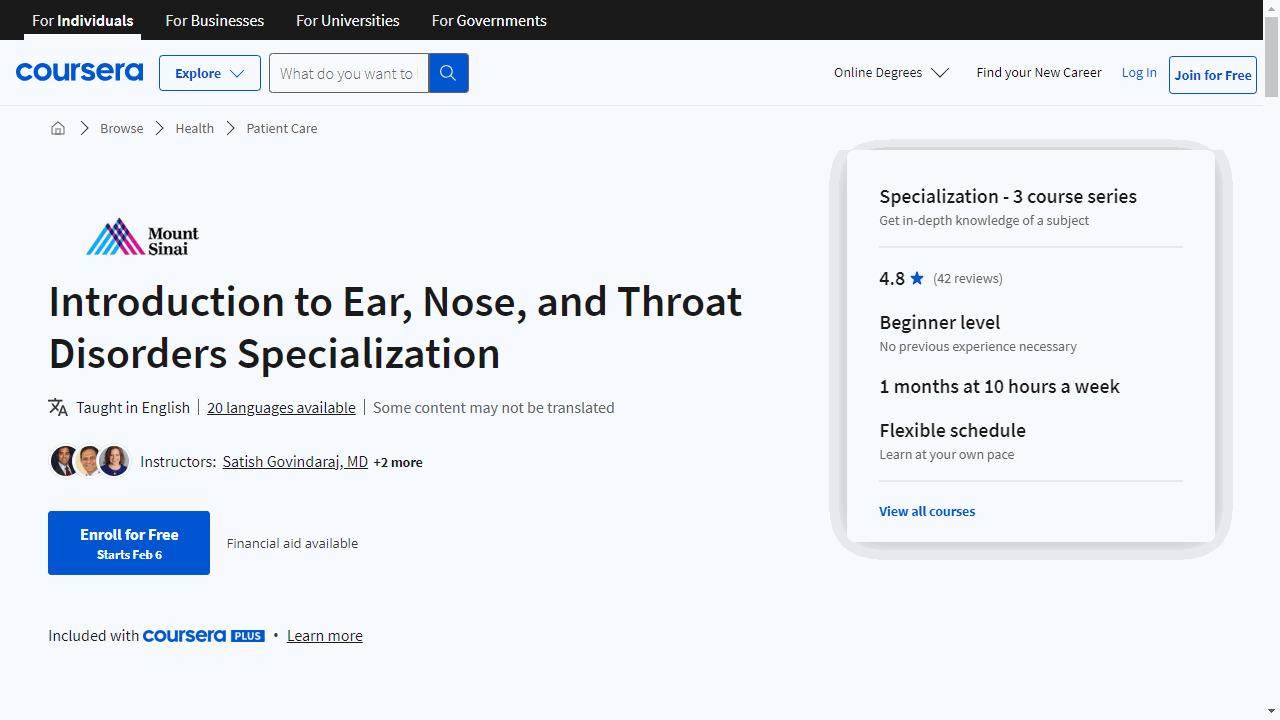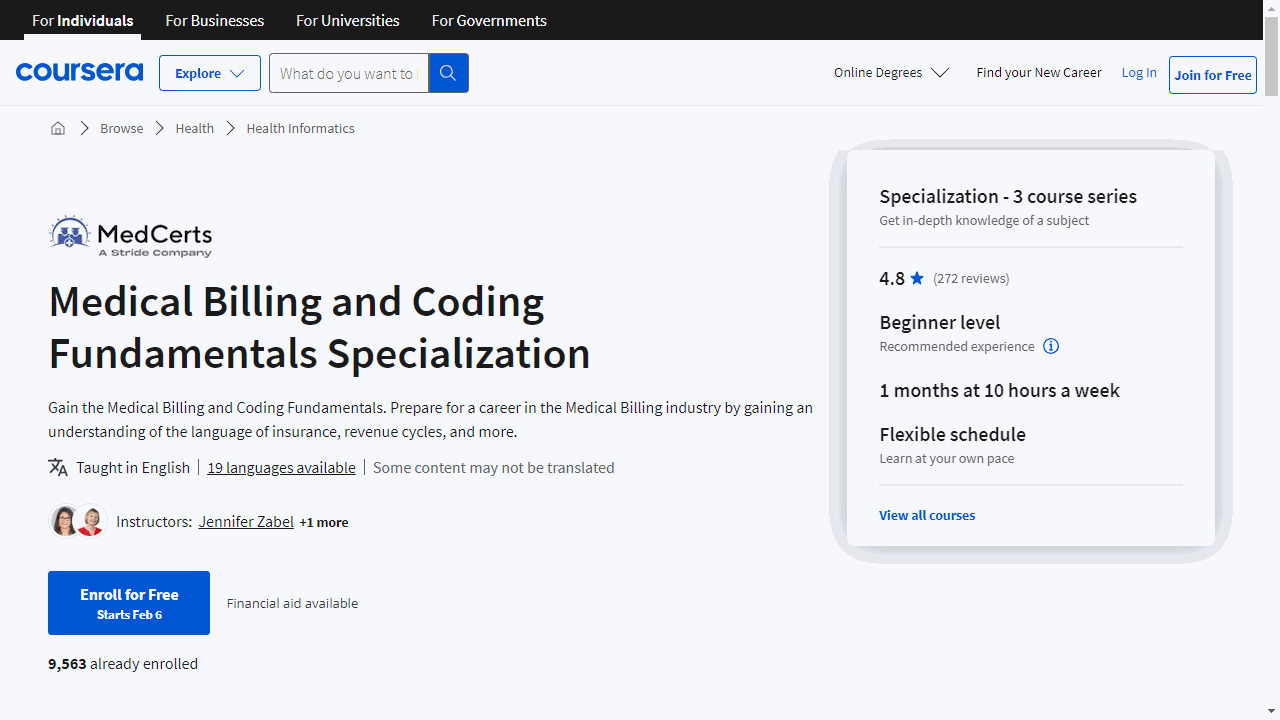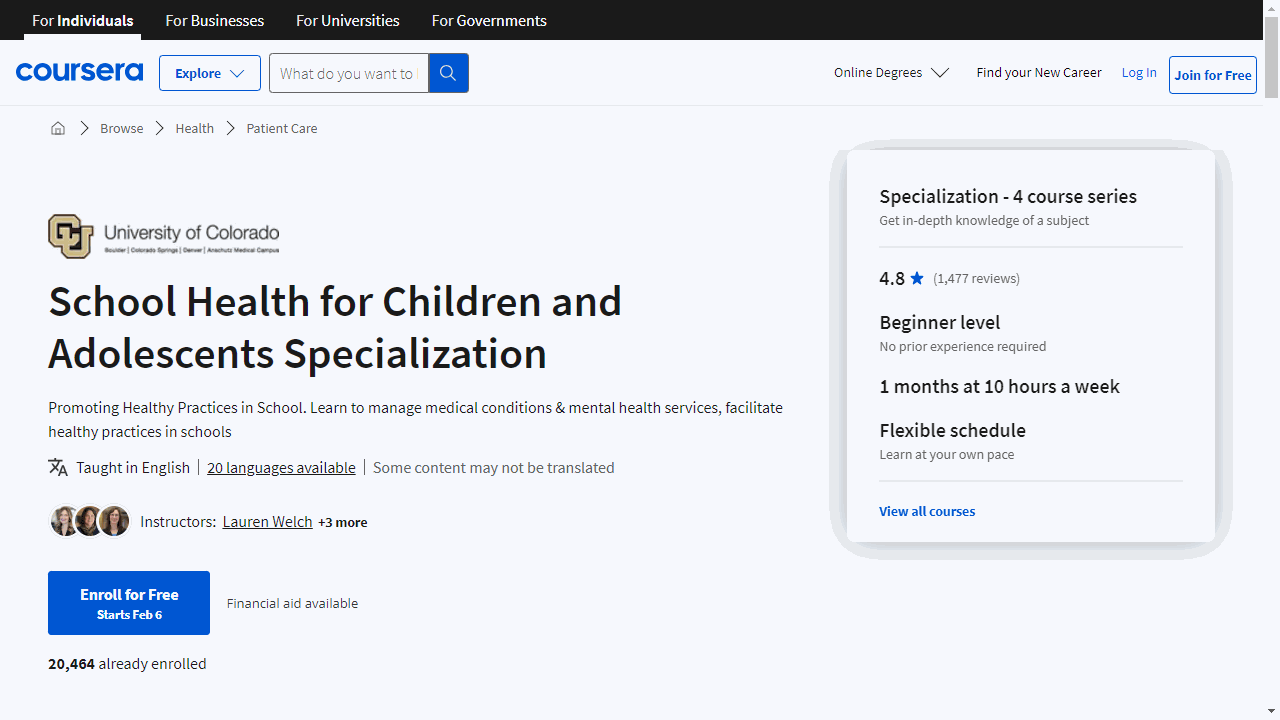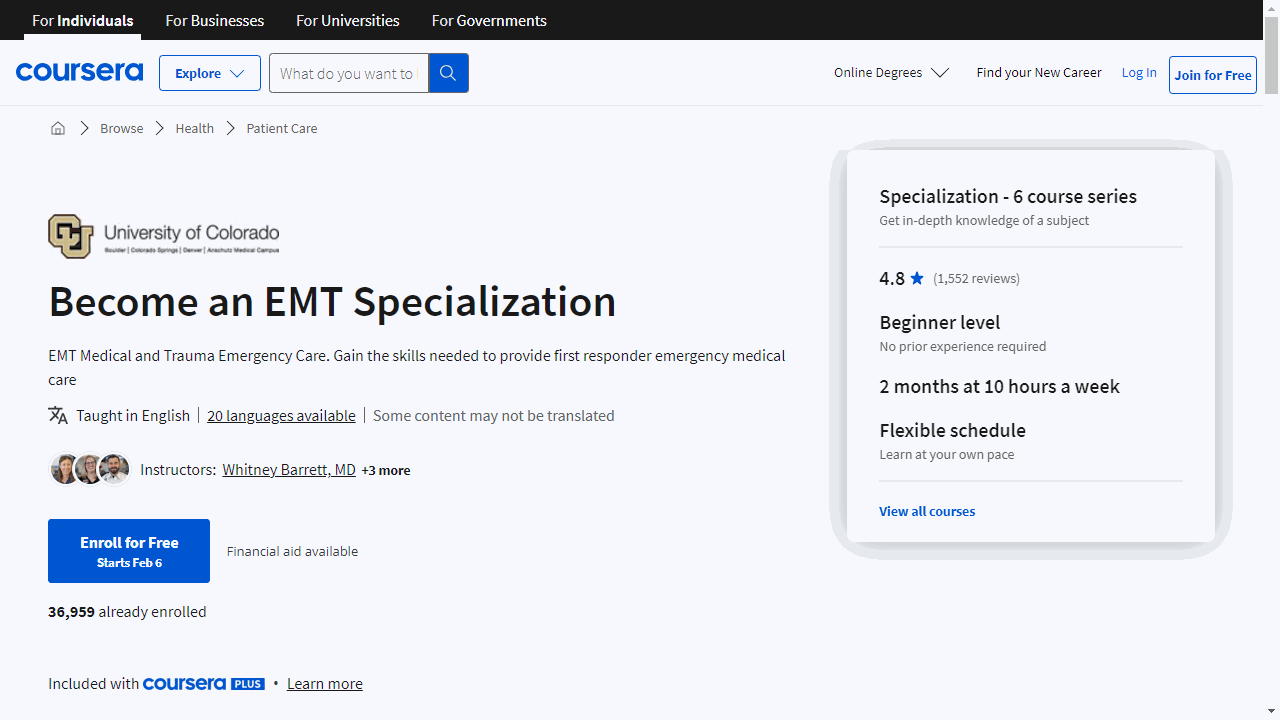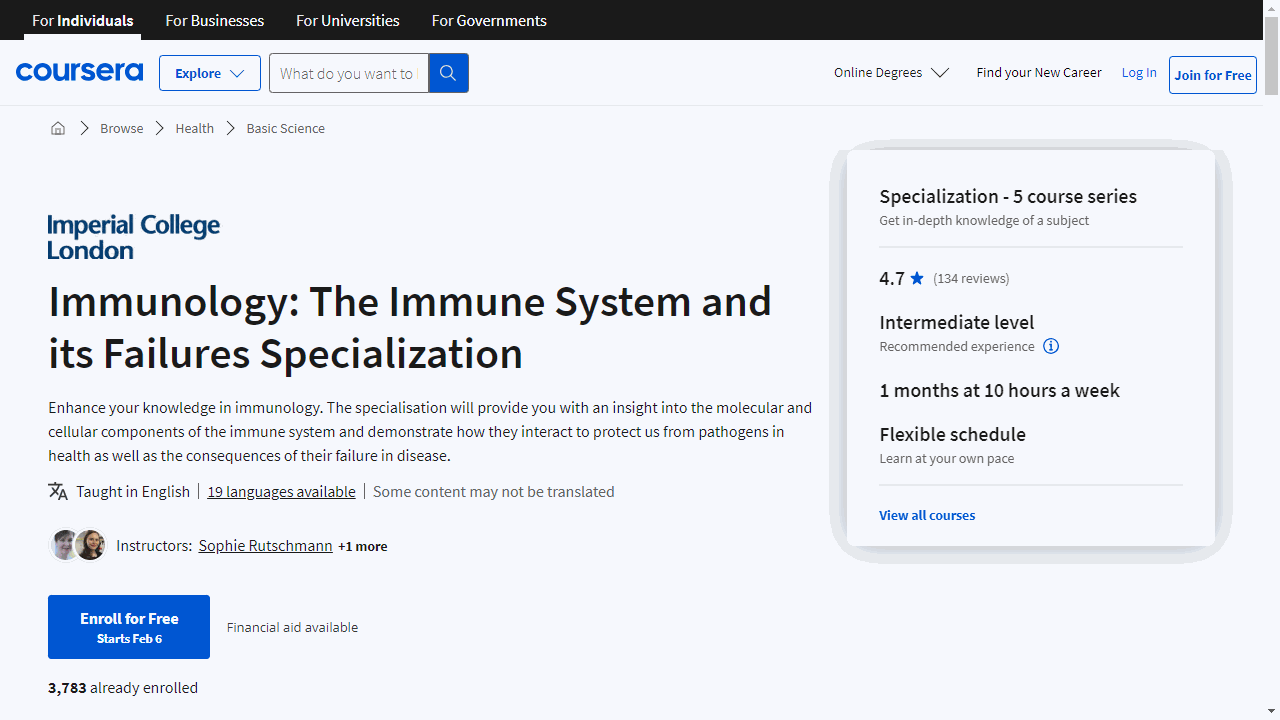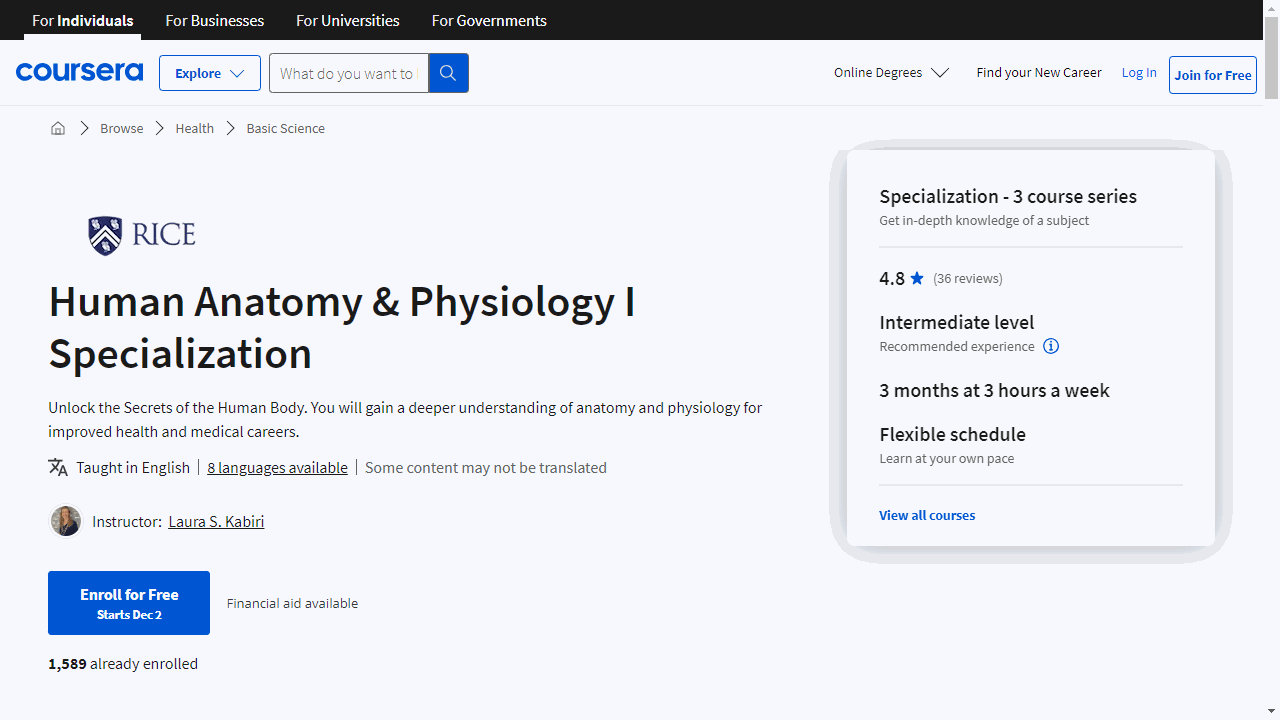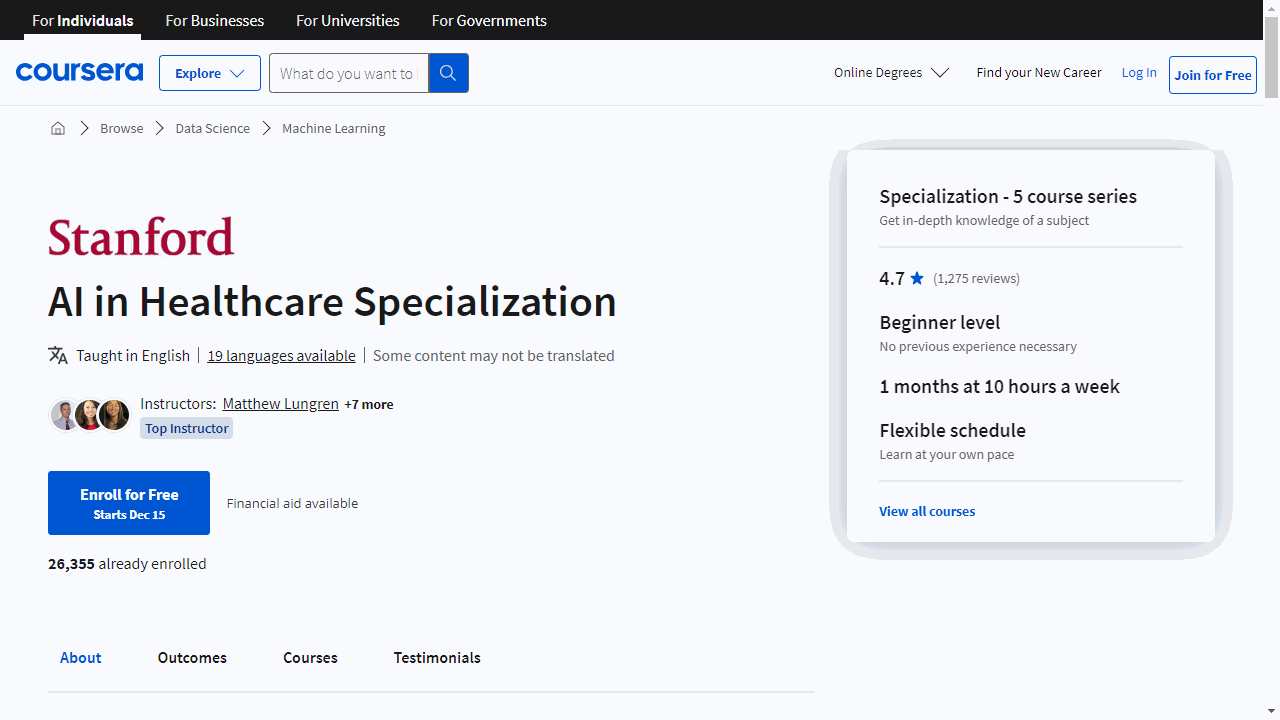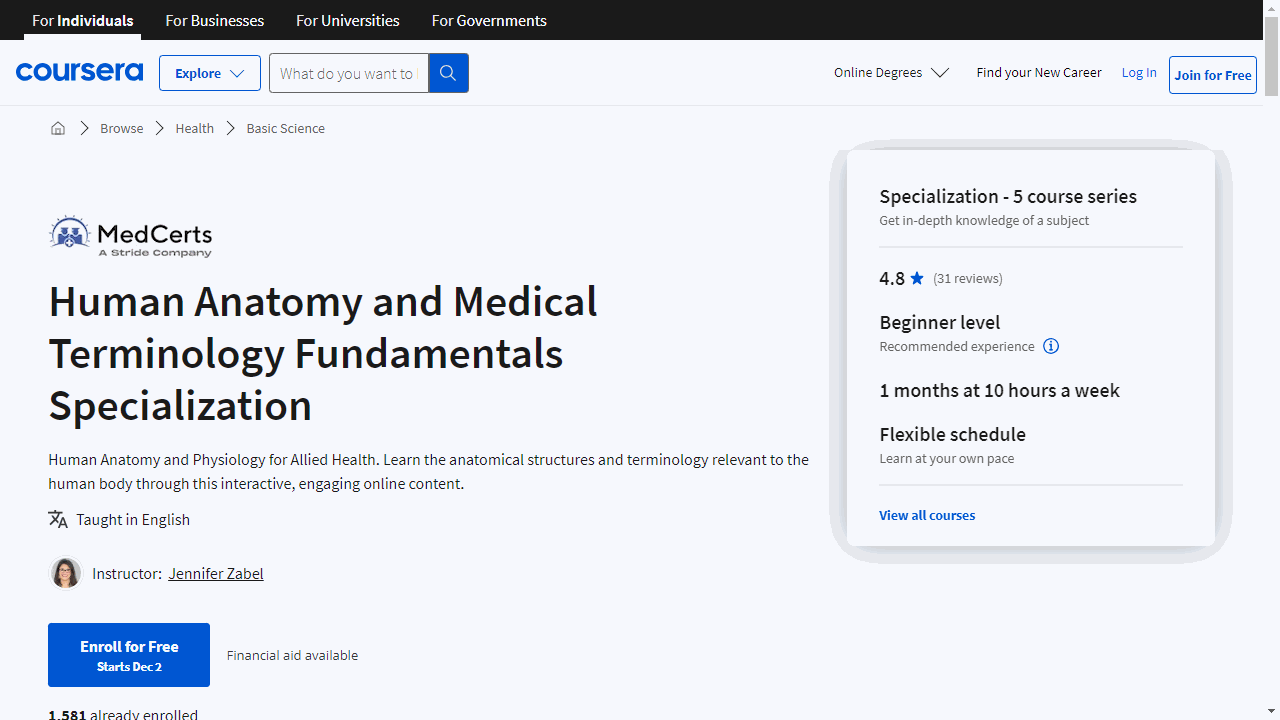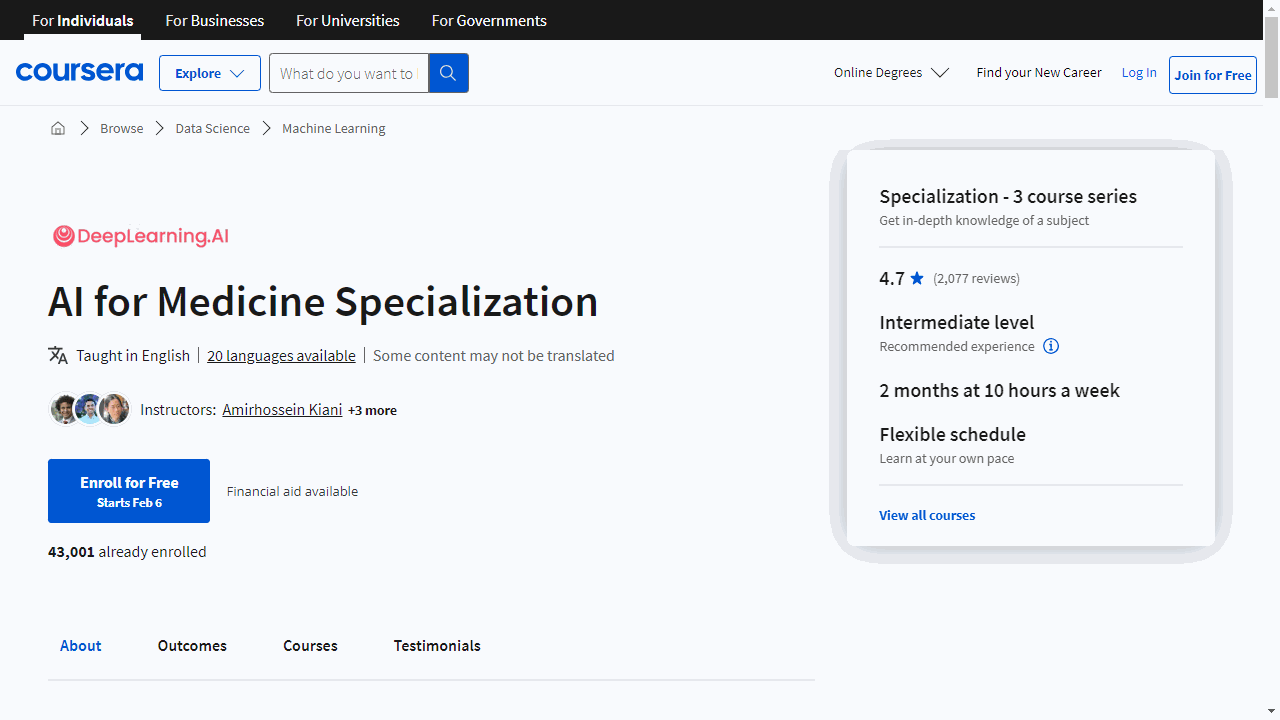Embarking in a learning journey across medical fields can be a daunting task, especially when you’re trying to find the best resources to learn it.
There are so many options out there, it can be hard to know where to start!
We’ve done the hard work for you and reviewed the best medical courses on Coursera to bring you the most comprehensive and insightful options available.
For the best medical course overall, we recommend “Medical Terminology Specialization” by Rice University.
This specialization stands out for its practical approach.
You won’t just memorize terms; you’ll learn how to apply them in real-world healthcare settings, making it an excellent choice for anyone looking to enhance their knowledge and skills in this area.
But if this isn’t quite right for you, we have plenty of other options.
Keep reading to explore our top picks for courses that cover different areas of the medical field, including cancer biology, anatomy, integrative health, and more!
Medical Terminology Specialization
Provider: Rice University
This three-course series builds your medical vocabulary, crucial for anyone aiming to excel in healthcare.
The journey begins with “Medical Terminology I,” where you’ll grasp the essentials of medical language.
This course simplifies complex terms related to the skin (integumentary system), muscles and bones (musculoskeletal system), and kidneys (urinary system), making it easier to understand medical records and communicate in healthcare settings.
Next, “Medical Terminology II” expands your knowledge to the endocrine system, focusing on hormones, and explores the cardiovascular, blood, and lymphatic systems, along with the respiratory system (lungs).
This course deepens your understanding of how the body functions and defends itself, essential for navigating the medical field.
Completing the series, “Medical Terminology III” covers the nervous system (including the brain, spinal cord, and nerves), special senses (eyes and ears), digestive, and reproductive systems.
This final course ensures you have a comprehensive grasp of medical terminology across all key body systems.
What sets this specialization apart is its application-focused approach.
You won’t just memorize terms; you’ll learn how to apply this knowledge practically, enhancing your effectiveness in any health-related role.
By the end of the series, you’ll confidently navigate medical terminology, making you more competent and efficient in the healthcare environment.
Cancer Biology Specialization
Provider: Johns Hopkins University
This series of courses deepens your understanding of cancer, its mechanisms, and treatments, making it ideal for aspiring cancer researchers or healthcare professionals aiming to broaden their knowledge base.
The specialization kicks off with “Introduction to the Biology of Cancer,” where you’ll dive into the molecular biology underpinning cancer, including the critical roles of oncogenes and tumor suppressor genes.
It thoroughly covers the biological hallmarks of cancer, diagnosis, staging, and treatment strategies, alongside the risk factors for the world’s major cancers.
Completing this course equips you with the ability to identify key cancer types, understand genetic contributions to cancer, and grasp the metastatic process and the significance of imaging in cancer management.
Following that, “Understanding Cancer Metastasis” focuses on the spread of cancer, a central challenge in its treatment.
This course demystifies the theories of metastasis, the biology driving it, and its impact on patients, providing essential knowledge for those committed to combating cancer.
The specialization also includes “Understanding Prostate Cancer,” led by Professor Ken Pienta, an expert with over 25 years of experience in prostate cancer research and treatment.
This course zeroes in on prostate cancer biology, screening, staging, and treatment options for various disease stages.
Anatomy Specialization
This specialization, by the University of Michigan, offers a comprehensive look at our complex anatomical systems.
Each course is designed to build your knowledge in a specific area, ensuring a well-rounded grasp of human anatomy.
Dive into “Anatomy: Musculoskeletal and Integumentary Systems” to explore how your bones, muscles, skin, hair, and nails function and protect you.
Through engaging videos and detailed anatomical images, you’ll learn the mechanics of movement and the body’s natural defense layers.
In “Anatomy: Cardiovascular, Respiratory and Urinary Systems,” you’ll uncover the essentials of how your heart, lungs, and kidneys operate.
Interactive lessons will guide you through the vital processes of circulating blood, breathing air, and eliminating waste.
“Anatomy: Human Neuroanatomy” brings you closer to understanding the central and peripheral nervous systems.
You’ll gain insights into how your brain communicates with your body, controlling everything from sensory perception to muscle movement and the stress response.
Lastly, “Anatomy: Gastrointestinal, Reproductive and Endocrine Systems” focuses on digestion, hormone regulation, and reproduction.
Clinical correlations bring these concepts to life, emphasizing the significance of each system in maintaining overall health.
Each course in this specialization is rich with practical knowledge, from understanding joint classifications to the pathways of nerves and blood vessels.
Integrative Health and Medicine Specialization
Provider: University of Minnesota
This set of courses equips you with essential skills to integrate holistic therapies into healthcare, improving patient outcomes and wellbeing.
The journey begins with “Introduction to Integrative Therapies and Healing Practices,” where you’ll explore the realm of integrative health.
This course empowers you to evaluate and introduce various therapies into your practice, ensuring you’re well-versed in discussing their evidence base and safety with patients and colleagues.
In “Guided Imagery,” you’ll delve into the therapeutic use of imagery for symptom management and health enhancement.
By experiencing and creating guided imagery scripts, you’ll learn how to tailor this powerful tool to meet specific patient needs, making it a valuable addition to your healthcare toolkit.
The “Herbal Medicine” course addresses the rising interest in natural remedies, providing you with a solid foundation in the therapeutic use, efficacy, and safety of herbal medicines.
This knowledge allows you to confidently incorporate herbal treatments into your practice, meeting patient demands for natural healthcare options.
“Aromatherapy: Clinical Use of Essential Oils” offers an in-depth look at how essential oils can be integrated into clinical settings.
You’ll gain the skills to assess, recommend, and apply essential oil therapies, enhancing patient care with aromatherapy’s therapeutic benefits.
Lastly, “Mindfulness in Integrative Healthcare” focuses on the application of mindfulness in healthcare settings.
You’ll discover the benefits of mindfulness for both patients and healthcare providers, including its role in managing stress, pain, and improving overall wellbeing.
Each course in this specialization not only enriches your knowledge and skills in integrative health practices but also offers continuing education credits, fulfilling requirements for various professional boards, including the Minnesota Board of Nursing.
Introduction to Ear, Nose, and Throat Disorders Specialization
Provider: Icahn School of Medicine at Mount Sinai
This specialization caters to a wide audience, including patients seeking to understand their conditions, healthcare providers aiming to enhance their practice, and individuals fascinated by otolaryngology.
Let’s explore the key features of each course in this specialization.
“Voice Disorders: What Patients and Professionals Need to Know” dives deep into the physiology of voice production and the management of voice disorders.
Over five weeks, you’ll explore the anatomy and physiology of the voice, learn about voice production styles, and understand the principles of voice evaluation and examination.
This course is essential for vocal trainers, medical practitioners, and otolaryngologists looking to fill the knowledge gap in voice disorders.
In “Acute and Chronic Rhinosinusitis: A Comprehensive Review,” you’ll differentiate and treat sinus conditions effectively.
Targeted at primary care physicians, otolaryngologists, nurses, and physician assistants, this course breaks down the anatomy and function of the sinuses, and guides you through diagnosing and treating acute and chronic rhinosinusitis, including when surgery is necessary.
It’s an invaluable resource for anyone seeking to deepen their understanding of sinus diseases.
“Introduction to Hearing Loss” provides a comprehensive overview of auditory disorders, from basic ear anatomy to the pathophysiology of hearing loss.
You’ll become familiar with the types of hearing loss, their common causes, and the disorders and treatments of the outer, middle, and inner ear.
This course, taught by experts in the field, is perfect if you’re interested in the complexities of hearing loss and treatment options.
Medical Billing and Coding Fundamentals Specialization
Provider: MedCerts
This specialization targets key areas in the medical field, ensuring you gain the necessary skills for a successful career in medical billing and coding.
The “Professionalism in Allied Health” course is a cornerstone of this specialization.
It goes beyond traditional learning, focusing on how you apply knowledge and interact in the workplace.
You’ll master soft skills such as patient interaction, medical ethics, and professional communication, all through engaging scenario-based and game-based learning.
This course prepares you to improve patient care and satisfaction with your enhanced emotional intelligence and communication skills.
Moving on, “Medical Terminology and the Human Body Fundamentals” dives deep into the language of medicine and the intricacies of human anatomy.
It simplifies medical terminology related to body systems, diseases, and procedures like endoscopy.
Understanding these terms is crucial for anyone dealing with medical records or patient care, making this course essential for building a strong foundation in medical knowledge.
Lastly, “Medical Billing and Coding Essentials” focuses on the administrative aspects of healthcare.
It covers the revenue cycle, insurance terminology, and the principles of medical billing and coding.
Through interactive eLearning elements, including video instruction and game-based learning, this course makes complex topics accessible.
You’ll learn to navigate billing laws, regulations, and standards confidently, ensuring patient information is managed with confidentiality and accuracy.
School Health for Children and Adolescents Specialization
Provider: University of Colorado System
This series targets key health issues and management strategies for children and adolescents in educational settings, blending practical knowledge with real-world applications.
The course “Managing Asthma, Allergies, Diabetes, and Seizures in School” equips you with the essentials to support students with these conditions.
It covers emergency planning, the role of school nurses, and strategies to promote overall student health, using real-life examples to enhance understanding.
For those interested in developmental and behavioral disorders, “Managing ADHD, Autism, Learning Disabilities, and Concussion in School” is invaluable.
It provides insights into recognizing symptoms, the diagnosis process, and managing ADHD, autism spectrum disorder, learning disorders, and concussions, enriched with clinician experiences and interactive scenarios.
“Providing Social, Emotional, Behavioral, and Special Education Services in School” focuses on the mental and emotional well-being of students.
It explores the connection between social-emotional skills, mental health, and learning, offering strategies for support, prevention, and intervention.
This course highlights the unique approach schools take towards mental health and disability services.
Lastly, “Healthy Practices: Nutrition, Physical Activity, and Community and Family Participation” delves into promoting physical health through nutrition and physical activity.
It discusses regulatory programs in the USA, the science behind physical activity recommendations, and ways to engage communities and families in health initiatives.
Real-life examples of successful school programs illustrate the impact of health on student success.
Become an EMT Specialization
Provider: University of Colorado System
This set of courses prepares you for a career as an Emergency Medical Technician (EMT), blending foundational knowledge with practical skills.
The journey begins with “EMT Foundations,” where you’ll dive into the EMS system’s workings, learn medical terminology, understand basic human anatomy, and master vital signs and patient safety.
It’s an ideal launchpad, providing a comprehensive overview of what it means to be a healthcare provider in emergency services.
Progressing to “Medical Emergencies: Airway, Breathing, and Circulation,” you’ll enhance your ability to assess and stabilize patients with respiratory and cardiovascular emergencies, alongside gaining insights into neurologic and endocrine emergencies.
This course is critical for grasping the breadth of medical situations an EMT faces.
“Medical Emergencies: CPR, Toxicology, and Wilderness” equips you with skills in high-performance CPR, managing shock and cardiac arrest, and addressing toxicological and environmental emergencies.
It ensures you’re prepared for a variety of challenging scenarios, from drug overdoses to hypothermia.
In “Trauma Emergencies and Care,” the focus shifts to understanding trauma’s impact on the body and learning to manage injuries effectively.
You’ll explore the trauma system, conduct thorough exams, and even tackle mass casualty incidents (MCIs), preparing you for the unpredictable nature of trauma care.
“Emergency Care: Pregnancy, Infants, and Children” brings attention to caring for vulnerable patient groups.
You’ll navigate the complexities of treating pregnant patients and children, enhancing your ability to handle high-stress situations with confidence and compassion.
Finally, “Prepare for the EMT Certification Test” not only readies you for the National Registry exam but also emphasizes applying your knowledge to provide exceptional patient care.
Through review materials, patient care scenarios, and peer review exercises, this course solidifies your understanding and skills, setting you up for success in the field.
This specialization covers essential topics like CPR, airway management, cardiovascular emergencies, and trauma care, alongside specialized care for infants, pregnant women, and handling environmental emergencies.
By completing these courses, you’ll be ready to ace the EMT certification test and excel in emergency medical services.
Immunology: The Immune System and its Failures Specialization
Provider: Imperial College London
This series of courses offers a deep dive into the immune system, detailing its operations, the challenges it faces, and what occurs when it malfunctions.
The journey begins with “Immunology: Innate Immune System,” where you’ll explore the body’s initial defense against infections.
You’ll understand the roles of key cells and mechanisms in the innate immune response and how our microbiota influences this process.
This course lays the groundwork by showing how innate immunity signals threats to the adaptive immune system.
Moving on, “Immunology: Adaptive Immune System” delves into the specialized immunity provided by T and B lymphocytes.
It covers how these cells distinguish between self and non-self antigens and the effects of aging on immune responses.
This knowledge is vital for grasping how our body refines its defense over time.
The specialization then addresses specific challenges in “Immunology: Autoimmunity, Allergy, and Transplants.”
Here, you’ll examine the consequences of an unbalanced immune response, leading to autoimmune diseases, allergies, and issues with transplants.
This course provides insight into the underlying mechanisms of these conditions.
In “Immunology: Immune System and Infectious Diseases,” the focus shifts to the battle between our immune system and pathogens like bacteria, viruses, fungi, and parasites.
You’ll learn about pathogen evasion strategies and their implications for health.
This course is especially relevant given the significant impact of infectious diseases globally.
Lastly, “Immunology: Immune Failures and Cancer Immunology” discusses the outcomes of immune system failures, including immune deficiencies, chronic inflammation, and the interplay between the immune system and cancer.
This course emphasizes the critical role of the immune system in cancer prevention and treatment.
Throughout this specialization, you’ll acquire skills in tumor immunity, autoimmunity, and infectious diseases.
Human Anatomy & Physiology I Specialization
This specialization, by Rice University, offers a comprehensive journey through the human body, crafted to build your understanding from the ground up.
Starting with “Anatomy & Physiology: Levels of Organization,” you’ll grasp the fundamental patterns and terms essential to anatomy.
This course is your stepping stone, introducing you to the microscopic building blocks—atoms and molecules—and guiding you through their assembly into cells, tissues, and organ systems, like the skin’s role in the Integumentary System.
The second course, “Anatomy & Physiology: Support & Movement,” focuses on the skeletal and muscular systems.
Here, you’ll learn the intricacies of bones and muscles, their cooperation, and their relevance to human development and health conditions.
It’s an ideal course if you’re fascinated by the mechanics of movement or are considering a career related to physical therapy or sports medicine.
In “Anatomy & Physiology: Regulation, Integration, & Control,” you’ll delve into the nervous and endocrine systems, the command centers for body regulation.
Discover how the brain, nerves, and hormones orchestrate every action and reaction, providing insights into neurological and hormonal functions.
Each course equips you with critical skills, from anatomical terminology to physiological processes, and emphasizes their clinical relevance.
You’ll also enhance your research abilities, ensuring you can navigate and interpret scientific information effectively.
By choosing this specialization, you’re not just learning; you’re gaining a rich, applicable understanding of human anatomy and physiology from a prestigious institution.
AI in Healthcare Specialization
Provider: Stanford University
By focusing on practical skills and ethical considerations, this specialization prepares you to be a part of AI’s transformative impact on healthcare.
Start with “Introduction to Healthcare,” where you’ll get a clear picture of the U.S. healthcare system’s inner workings.
Understanding the roles of physicians, hospitals, and insurance is crucial, and you’ll tackle the big issues like managing costs and improving care quality.
Move on to “Introduction to Clinical Data,” which equips you with the tools to ethically mine medical data.
You’ll learn to craft datasets and analyze them to answer clinical questions, all while considering the ethical implications of your work.
In “Fundamentals of Machine Learning for Healthcare,” you’ll demystify machine learning, even if you’re new to the field.
This course breaks down complex concepts like neural networks and model training into digestible parts, empowering you to evaluate and deploy AI in medicine confidently.
Then, “Evaluations of AI Applications in Healthcare” guides you through integrating AI into clinical settings.
You’ll explore how to assess AI’s impact on healthcare delivery, ensuring that the technology is used fairly and effectively.
The “AI in Healthcare Capstone” is where theory meets practice.
You’ll dive into a real-world scenario, using a unique dataset to build models that inform patient care decisions.
This hands-on project also addresses the regulatory and ethical considerations of using AI in healthcare.
Throughout these courses, you’ll gain continuing education credits, a bonus for healthcare professionals looking to stay ahead.
Human Anatomy and Medical Terminology Fundamentals Specialization
This comprehensive program kicks off with “Medical Terminology, Anatomy, and Physiology Fundamentals,” where you’ll dissect medical terms to grasp their meanings, delve into the human body’s structure, and understand how diseases affect it.
Dive deeper with “The Skin, Bones, and Muscles” course, focusing on the integumentary, skeletal, and muscular systems.
You’ll learn the specific medical vocabulary for these body parts and identify common diseases that can impact them.
In “The Human Body’s Communication Systems,” you’ll unravel the complexities of the nervous and endocrine systems.
This course equips you with the terminology and knowledge to discuss conditions related to body signaling and hormonal balance.
“The Heart, Blood, and Lungs” course will guide you through the cardiovascular, immune, and respiratory systems.
You’ll gain insights into how these systems function, the medical terms that define them, and the diseases that can disrupt their harmony.
Finally, “Digestion, Micturition, and Reproduction” covers the digestive, urinary, and reproductive systems.
You’ll understand these systems’ roles, learn the language to describe their functions, and discuss prevalent diseases.
Each course is designed to build your proficiency in medical terminology and anatomy, preparing you to navigate medical records and understand the human body’s workings.
AI for Medicine Specialization
Provider: DeepLearning.AI
This specialization equips you with the skills to apply AI in diagnosing diseases, predicting patient outcomes, and personalizing treatments, all without needing prior medical knowledge.
In “AI for Medical Diagnosis,” you’ll jump into using AI for image analysis, focusing on lung and brain disorders.
You’ll learn to build convolutional neural network models for image classification and segmentation.
This course is ideal if you’re keen on understanding how AI can interpret medical images.
A background in AI algorithms and intermediate Python programming is necessary, setting a solid foundation for tackling healthcare challenges.
Moving on to “AI for Medical Prognosis,” the course demystifies how machine learning can forecast patient health.
Through hands-on examples, you’ll master decision trees and address common issues like missing data.
This segment emphasizes tree-based machine learning, welcoming those new to deep learning.
It’s an excellent choice for exploring how AI can enhance predictions in patient health outcomes.
The final course, “AI For Medical Treatment,” focuses on customizing medical treatments using AI.
You’ll analyze data from randomized control trials to tailor treatments to individual patients and employ natural language processing for automating medical data labeling.
This course is perfect for anyone interested in how AI can personalize medicine.
Throughout the specialization, you’ll acquire skills in machine learning, deep learning, model evaluation, and more, applying your knowledge to real-world medical problems.
The courses are designed to be practical and applicable, ensuring you can navigate the complexities of AI in the healthcare industry.
